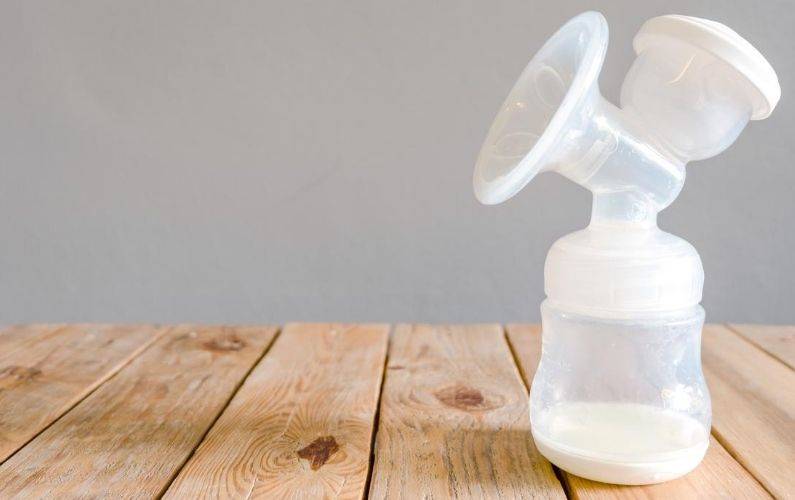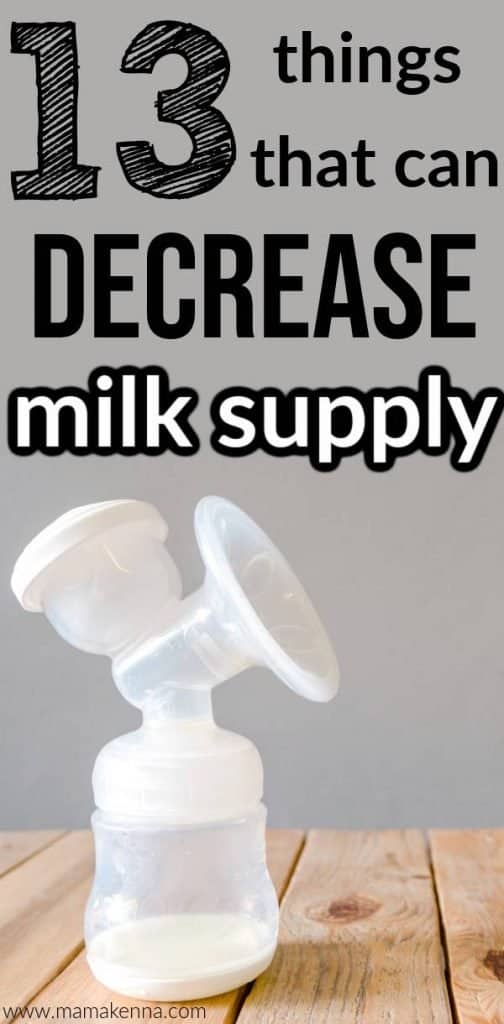13 Surprising Things That Can Decrease Your Milk Supply

One big worry that lots of new moms get is having a breast milk supply that doesn’t meet the baby’s needs.
I mean NO ONE wants to start or even feel like they’re making less!
I know from experience what it’s like to worry about whether or not I’m making enough milk for the baby.
So like many other breastfeeding moms, I learned about what things can increase milk supply, looked up lactation recipes, and read about possible causes of a low breastmilk supply.
And believe it or not there are actually some things that can have a negative effect on your milk supply.
It’s a good idea for breastfeeding mothers to be aware of them so that they don’t unknowingly lower the amount of breast milk they make.
Because like I said earlier, NO mom wants her supply to decrease!
Below you’ll find foods and other surprising things that can decrease milk supply.
(This post may contain affiliate links which means I may earn a small commission at no extra cost to you. You can read my full disclaimer policy here.)
Things That Can Decrease Milk Supply
Stress
Stress can affect a lot of different things, so it doesn’t surprise me that being stressed can possibly reduce your milk supply.
In this article about stress and breastfeeding, it says that not only can stress decrease your milk supply but it can lead to a difficult let-down reflex and early weaning.
Other emotional feelings like being nervous can also cause you to have trouble with the let-down reflex.
Lack of Sleep
Let’s face it.
Being a mom can be exhausting!
And when you’re recovering from birth and taking care of a newborn, you’ll experience a whole new world of tired.
Not getting enough rest may actually affect your milk supply and cause you to produce less.
If you feel like this could be a cause try taking more naps with baby, have your partner or grandma come over and watch the baby (or your older kiddos) for a bit while you rest awhile, or have someone help out with some household duties for you.
Pregnancy
I feel like this is something that’s never talked about.
In fact, I didn’t even realize being pregnant would lower my milk production until AFTER I got pregnant!
So if you don’t know this already you need to hear this now…
Pregnancy will not only lower your milk supply but eventually, your supply will COMPLETELY dry up!
Yes, when you become pregnant there will be a point where you won’t be able to make any breast milk at all.
The reason this happens is from those lovely pregnancy hormones.
Typically women start noticing their supply decreasing or gone sometime during the 1st or 2nd trimester.
Now, unfortunately, there’s nothing you can really do to stop this from happening.
So be mindful of that if you still have a little one who is more reliant on breastmilk.
Smoking
Smoking could interfere with the hormone, oxytocin, which helps breast milk get released from the breasts.
This means if breast milk isn’t coming out (or not enough is) this could single to your body, “Hey, the baby isn’t eating that much, we should start making less”.
Which in turn could cause you to start producing less.
Certain Medications
Taking certain medications can have adverse effects on your milk supply.
Medications with the ingredient, pseudoephedrine, can lower your breastmilk supply.
It is normally found in cold, sinus, and allergy medications.
Certain birth control pills can also affect milk production. These are normally the hormonal ones that contain the hormone, estrogen.
So before taking any medications, make sure that you ALWAYS tell your doctor that you’re breastfeeding and be sure to check the ingredients yourself before taking any.
Not Drinking Enough Water
Did you know that breastmilk is 88% water??
Crazy right!
In fact, drinking water is one of the most common and best ways to help your body make more breastmilk!
So be sure to drink plenty of water!
Especially if you’re more on the dehydrated side.
Not Eating
This makes sense.
I mean you need something to make something right?
And if you’re not eating or hardly eating at all, how is your body gonna make milk?
I mean you can’t make it from breathing!
So just remember that you need to be consuming food and water so your body has something to actually turn into breastmilk.
Certain Essential Oils
If you like using essential oils, then you’re one of many many people who do!
Some people even use them daily!
But, if you’re breastfeeding, you may want to stay away from these essential oils as they can make your supply decline.
- Lemon Balm
- Peppermint
- Oregano
- Cinnamon
- Cassia
- Clary Sage
Cabbage Leaves
Using frozen cabbage leaves has been said to help with breast engorgement. In fact, many women use this method to help get some much-needed relief!
But doing it too much could cause your body to not make much milk.
So be sure to not overdo it!
It’s recommended that women do for 20 minutes and no more than 3 times per day.
Alcoholic Beverages
Alcohol can cause the let-down reflex to well, not “let down” as well as it should.
And if the body can’t express enough breast milk out properly, it could cause less milk to be made.
Coffee
Now I know what you’re thinking…
“WHAT NO COFFEE HOW WILL I FUNCTION?!?!”.
Now I’m not saying you can’t have coffee, so you can sit back down and take a nice deep breath.
*breaths in and out*
Better?
Good!
Alright now drinking coffee is just fine while breastfeeding, but having too much caffeine can possibly cause your body to produce less breast milk.
This may be because consuming large amounts of caffeine can dehydrate you which can cause less boobie milk to be made.
The recommendation is about 1-2 cups of coffee per day if you’re a nursing mom.
Certain Teas
Certain herbs used to make teas can cause issues with your milk supply.
Unlike how mother’s milk tea can help promote breast milk production.
So when choosing some yummy teas, be sure to avoid:
- Peppermint
- Spearmint
- Borage
- Comfrey
- And any teas that contain basil, ephedra, ginseng, aloe, black cohosh, and licorice.
Some teas may also contain caffeine. And as we read from above, too much caffeine may hurt breastmilk production.
Certain Herbs
Herbs are great for cooking, making teas, and many other things!
But these herbs can actually decrease it instead of increasing it.
Below are the most common ones to stay away from or to avoid in large amounts when you’re nursing.
- Parsely
- Sage
- Oregano
- Peppermint
- Spearmint
- Jasmine
- Chasteberry
- Yarrow
- Thyme
- Black Walnut
- Chickweed
- Herb Robert
- Sorrel
- Periwinkle
Here’s a list of other herbs to avoid as they may be harmful to mom and baby.
Common Things That Are Mistaken as Low Milk Supply
Time and time again new mothers think they have a low milk supply when really, their milk supply is just where it’s supposed to be.
This normally happens in the early days after the baby is born.
This panic often leads to moms giving their newborn infant formula to help “make up” what they think the baby is not getting.
Common things that are mistaken as low milk supply include:
- Weight is lower than birth weight
- Cluster feeding
- Milk is only coming out in small amounts
It’s normal for baby to lose a tiny amount of weight after they’re born.
Also, the frequent nursing that the baby is doing is called cluster feeding. It’s your baby’s way to help your milk production to increase!
And what you may think is a tiny amount of milk, is probably just right for them. This would only be of concern if the baby is super fussy and is having a decrease in dirty diapers.
Real Signs of a Low Milk Supply & What to Do
All too often moms think their milk supply is low.
When sometimes it’s just fine!
Below are real signs that your milk supply is decreasing:
- Baby has poor weight gain
- Baby isn’t producing enough wet diapers
- Your baby is showing signs of hunger and dehydration
If your baby is showing any of these symptoms the best thing you can do is to get ahold of the baby’s health care provider and see a lactation consultant.
They specialize in breastfeeding and will be able to see if the baby is latched on correctly and if your milk supply is actually low.
If they find that you’re not producing enough milk they will help you find ways to start increasing it again.
You can also learn how to increase and “master” your milk supply here.
Foods that Promote Milk Production
If you’re looking for things that may help your milk supply, then try looking into what foods you can start incorporating into your diet.
Certain foods can actually help increase your breast milk supply.
The best foods include:
- Leafy greens
- Whole grains
- Fenugreek seeds
- Oatmeal
- Barley
You can also check out this list of lactogenic foods to help increase your milk supply.
Are There Certain Foods that I Should Avoid When Breastfeeding?
Now, these foods won’t necessarily decrease your milk supply, but it’s advised that nursing moms avoid or limit the amount of these certain foods.
This is because the baby could be affected by them and could make them upset and irritable.
Specific foods you may want to be mindful of or stay away from are:
- Fish high in mercury
- Dairy products
- Garlic
- Gassy foods
- Spicy foods
- Tomate sauce
- Caffeine
All babies are different and won’t have the same sensitivities that others may have.
The best thing you can do is just try it and then listen to your baby.
If you feel like it’s something that you’re eating that’s causing the baby discomfort, try eliminating a food from your diet. They say to do this for 2-4 weeks and see if you notice a difference with the baby.
You may want to consult with the baby’s doctor before you start taking any foods out of your diet as the baby’s fussiness could be caused by something else.
In Conclusion
The best piece of advice I can give you is to just listen to your body and listen to your baby.
You’re the mom so you’ll know if your supply or baby seems a bit off.
If you feel like your milk supply is decreasing try doing some of the things that can increase milk production and see if any of these possible things that can decrease milk supply could be the cause.
Talking to a certified lactation consultant may be beneficial as well.
Because sometimes a low milk supply could be caused by improper latching which can lead to difficulty expressing the right amount of milk from the breasts.
Sometimes babies have sensitivities to foods as well as other things.
So if you’ve tried all the things and just can’t figure it out, talk to your baby’s healthcare provider and see if it could be food/diet-related (or perhaps something else entirely).
(Please keep in mind that I am NOT a doctor, breastfeeding specialist, lactation consultant, or any other kind of medical professional. I am only a Mom who is going off of her own experience and research. You can read my full disclaimer policy here.)
Other Posts You May Like:
Honest Milkology Breastfeeding Class Reviews
Must-Have Products for Breastfeeding Moms
Tips on How to Get the Proper Latch
Best Pumping Items for When You’re On the Go
What foods or other things have you discovered that increase or decrease YOUR milk supply? Are there certain foods you avoid while breastfeeding because the baby is sensitive to them? What are they? Tell me below in the comments! And if you liked this post, give it a share! Thanks!


